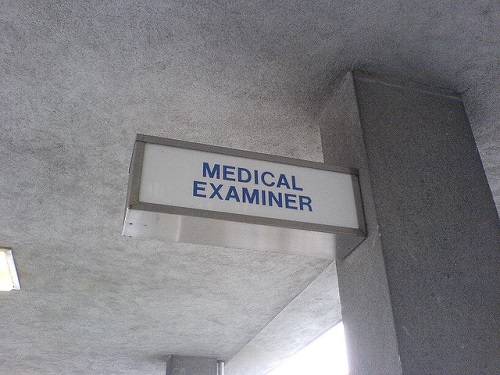Differences Between a Coroner and a Medical Examiner
The terms “coroner” and “medical examiner” are often used interchangeably that not many people are aware of the differences between the two titles as well as their corresponding responsibilities.
Coroner
The coroner system is an old one, which dates back to 12th century England. (1) The position was originally known as “crowner,” (2) because a coroner is responsible for confirming the deaths in his jurisdiction as well as collecting the share of the Crown in the estate. The system was brought to North America in the 1600s.
At present, a coroner’s job is to probe an unexpected or violent death due to suicide, poisoning, negligence, or accident. The inquest of a coroner is also a requisite in cases where a fatal disease constitutes a public health threat or a death occurs under suspicious circumstances or when the person was in the custody of the government.
A coroner must be a citizen of the United States, a resident of the state or region where he or she works, and must be of voting age. With usually a two- to four-year term, a coroner can be elected or appointed. While many coroners are qualified pathologists with several years of experience, a coroner does not necessarily need to be trained in forensic science. In fact, some counties do not require coroners to have even a medical background.
The main reason why a medical qualification is not required in the selection of a coroner is the limited resources of some rural areas where there are not many forensic pathologists nor the facilities necessary to perform their jobs properly. Also, there is very little or no unexplainable deaths or violent crimes in rural areas so having a full-time forensic pathologist is not required. In some jurisdictions, the tasks of coroner as well as that of sheriff are bundled as a way to conserve the resources of the community.
In terms of education and experience, there are no set requirements for one to become a coroner, (3) (4) (5) but a detailed knowledge of the following will improve a candidate’s chances:
- Physiology
- Anatomy
- Medical terminology
- Information gathering
- Basic rules of evidence
- Interviewing techniques
- Investigative principles and techniques
In addition, coroners are required to meet the minimum standards for peace officers and pass a POST exam in many jurisdictions. Coroner training will also require some degree of formal education, such as a bachelor’s degree in the fields of anatomy, criminology, experimental pathology, forensic science, medicine, pathology, physiology, or pre-medicine.
Medical Examiner
Originating in France and Scotland and brought to the U.S. in the late 1800s (1), the medical examiner system came about as urban areas began to recognize the importance of having full time, trained, and competent physicians to determine the cause of death. Usually trained forensic pathologists, medical examiners are employed by federal, state, or local governments. They can also work under the employ of the military, medical schools, as well as hospitals. Medical examiners perform autopsies, conduct clinical tests, and act as expert witnesses in cases involving violent or undetermined deaths. (6)
To become a medical examiner, one must be focused and dedicated in pursuing the career path as the profession requires one to complete prerequisite undergraduate coursework, medical school, a residency in pathology, and a fellowship in forensic pathology. All of these usually takes around 12-14 years.
The following are the specific requirements to qualify as a medical examiner: (7)
- Required education
- Bachelor’s degree
- Medical degree
- Pathology residency
- Forensic pathology fellowship
- Certification and Licensure
- State licensure
- Board certification (which most employers prefer)
- Others
- Continuing Medical Education (CME) credits to maintain licensure (8)
When a physician qualifies for the position, he or she can apply as a medical examiner, and because the job is based on professional skill, he or she is always appointed.
To summarize, here are the relevant similarities and differences between a coroner and a medical examiner:
Similarities:
- Both coroner and medical examiner investigate death, particularly one that is untimely, unexpected, sudden, violent, or the cause of which is unknown.
- Both determine the cause of death, whether it was due to natural causes, a homicide, an accident, a suicide, or undetermined causes.
- Both assign the cause of death when issuing death certificates.
Differences:
- A coroner is not required to have a medical background while a medical examiner is almost always required to be a physician.
- A medical examiner performs autopsies while a coroner doesn’t.
- A medical examiner is almost always required to be a pathologist or a forensic pathologist while a coroner isn’t.
- A coroner may be elected or appointed while a medical examiner is always appointed.
- Difference Between Snowstorm and Blizzard - December 18, 2018
- Difference Between Foreword and Preface - October 4, 2018
- Difference Between Shade and Shadow - October 3, 2018
Search DifferenceBetween.net :
1 Comment
Leave a Response
References :
[0](1)https://www.nlm.nih.gov/visibleproofs/galleries/cases/examiner.html
[1](2)http://www.britannia.com/history/coroner1.html
[2](3)http://www.npr.org/2011/02/02/133403760/coroners-dont-need-degrees-to-determine-death
[3](4) http://www.crimesceneinvestigatoredu.org/coroner/
[4](5)https://www.cdc.gov/phlp/publications/coroner/training.html
[5](6)http://www.crimesceneinvestigatoredu.org/medical-examiner/
[6](7)http://study.com/educational_requirements_for_medical_examiner.html
[7](8)http://www.cmeweb.com/gstate_requirements.php
[8]https://www.flickr.com/photos/brettlider/116132998


Fantastic job..